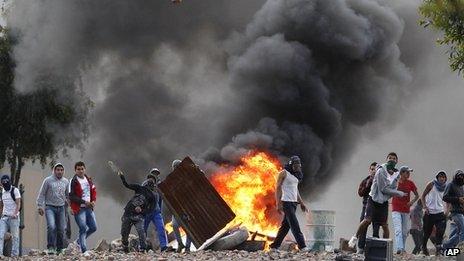Colombian government to negotiate with striking farmers
- Published

Protests turned violent in Ubate, north of Bogota, on day eight of a farmers' strike
Colombian President Juan Manuel Santos says his government will enter into negotiations with agricultural workers as their strike enters its ninth day.
President Santos invited strike leaders from the three worst-affected provinces to talks with key ministers in Bogota.
The protests against the government's agricultural policies have created transport chaos in parts of Colombia.
The government had said it would not meet the protesters until they lifted their road blocks.
But speaking on Monday after meeting strike leaders in the central town of Tunja, President Santos said that he and his minsters "were determined to confront the problems and work hand in hand with the farmers to see how we can get out of this situation".
He said he wanted to ensure that farmers had "a decent income, could continue working the land and look forward to a future with more hope and optimism".
Widespread anger
Eleven major roads continue to be blocked by the protesters, who include dairy farmers; potato, onion, rice and coffee growers; and lorry drivers.
Roadblocks erected by the protesters have cut off much of Boyaca province
The protesters accuse the government of running the agricultural sector into the ground.
They say that free trade agreements with the United States and the European Union are flooding the market with cheap imports while their costs for items such as fertilisers and fuel have gone up.
The president of the National Union of Farm Workers, Ederto Diaz, said small-scale farmers were the worst-hit by the free trade agreements with the EU, which came into force this month, and with the US, which has been in force since last year.
"We're not going to leave this country to the big farmers, or the multinationals which are taking over the land," he said.
Deadly clashes
On Tuesday, 15,000 people marched through Tunja to show their support for the farmers, who say that they are facing bankruptcy unless the government gives them a price guarantee for their harvests.
Over the past nine days, hundreds of thousands of farmers have been gathering in cities throughout Colombia, with the central provinces of Boyaca and Cundinamarca and southern Narino particular hotspots.
President Santos said his ministers would discuss a number of measures aimed at easing the pressure on farmers, including easier access to loans, lowering the high cost of fertilisers and boosting prices for their products.
He also said that there would be an investigation into allegations that riot police had beaten protesters and bystanders.
Head of Police Gen Rodolfo Palomino also promised an inquiry into accusations of abuse of power by his officers.
The general said 160 police had been injured and one officer shot dead policing the protests.
The meeting between the ministers and protest leaders was scheduled to take place later on Tuesday.
- Published24 August 2013
- Published26 February 2013
- Published15 May 2012